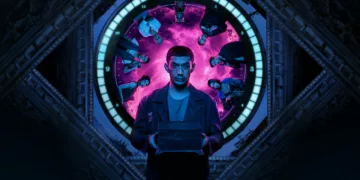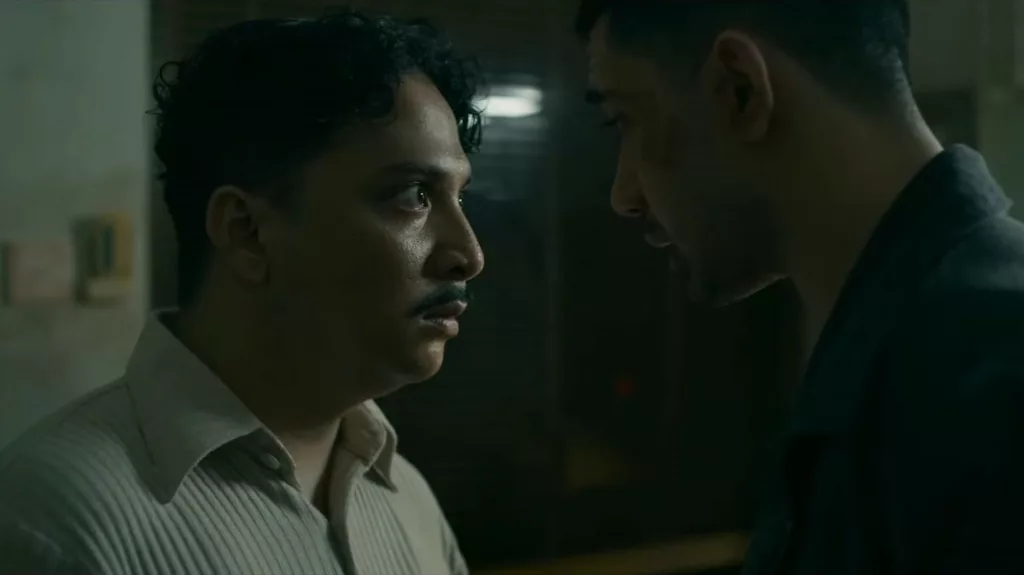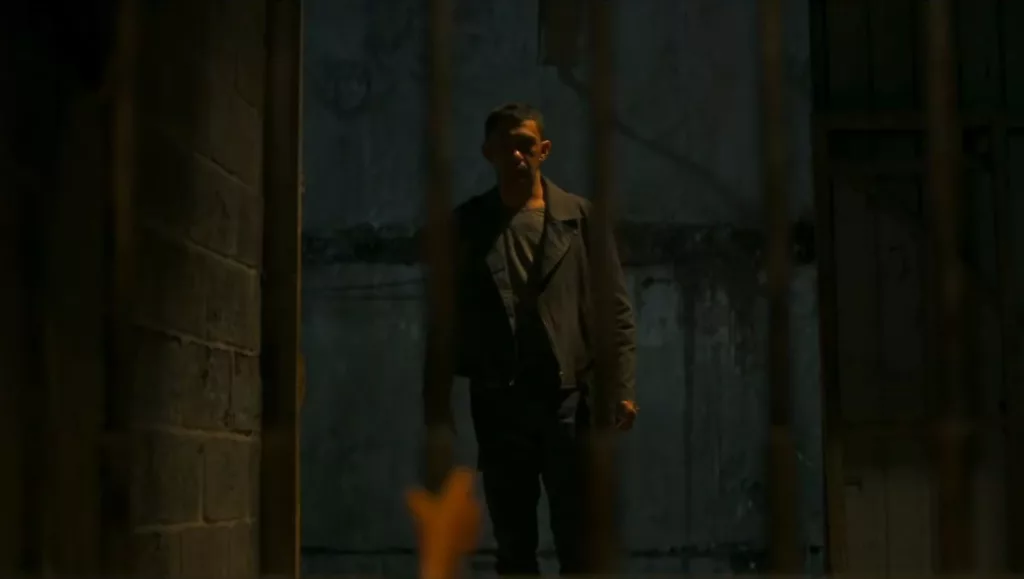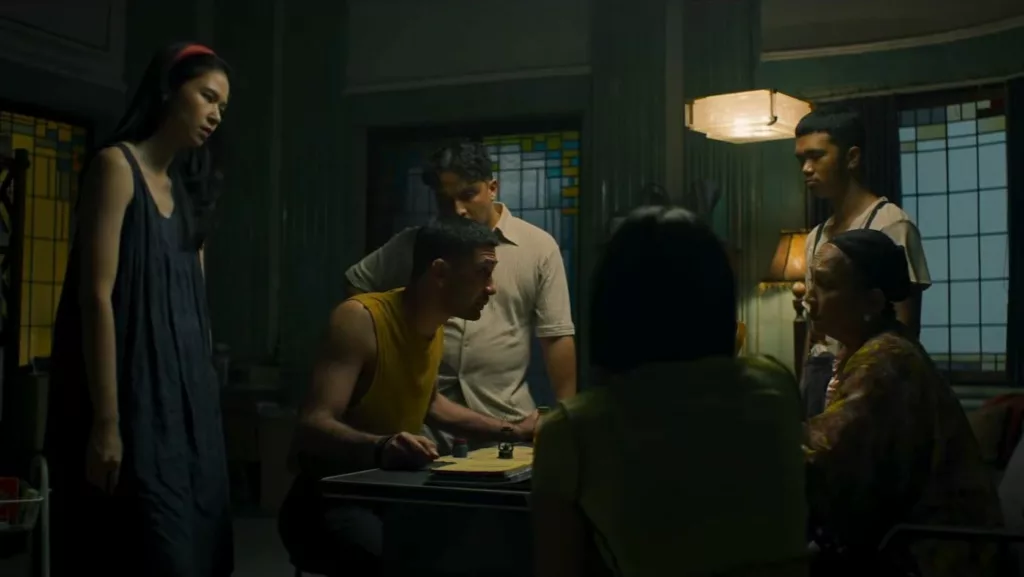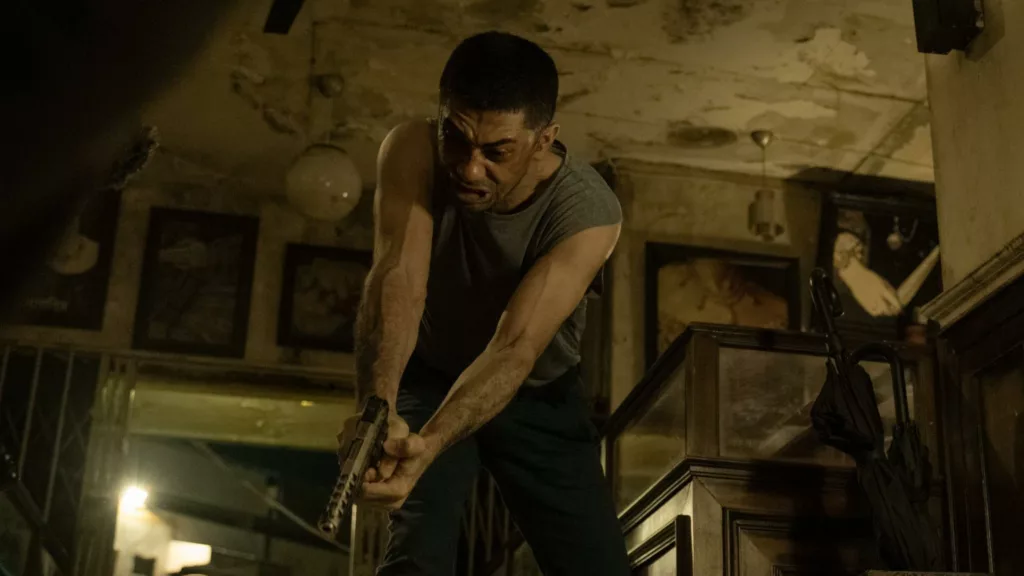They called him Gaspar, a troubled detective living in a dark future where society has fallen to ruin. With his heart flawed and time running out, Gaspar must find the truth behind the disappearance of his childhood friend Kirana before his final hours are up. Such is the premise of 24 Hours with Gaspar, an Indonesian neo-noir thriller directed by Yosep Anggi Noen.
Adapted from a novel by Sabda Armandio, the film stars Reza Rahadian as Gaspar, a detective whose unorthodox methods have made him both respected and feared. Plagued by health issues, Gaspar has less than a day to live before his defective heart gives out for good. Yet instead of making peace, he chooses to spend his remaining time unraveling the mystery of what really happened to Kirana all those years ago. His investigation leads him down a dark path, uncovering sinister secrets and forcing confrontations with dangerous men like the shady merchant Wan Ali.
As his clock winds down, Gaspar recruits an unlikely crew to help take Wan Ali and his criminal enterprise down for good. This includes his old friend Agnes, who runs an underground fighting ring, and Kik, a childhood companion of both Gaspar and Kirana. Together, they embark on a high-stakes heist during Gaspar’s final hours, unsure of what dangers may await or if any of them will make it out alive.
Through Gaspar’s twilight crusade for vengeance, 24 Hours with Gaspar explores heavy themes of disillusionment, collapsing social orders, and what it truly means to find purpose in a hopeless world. While not without its flaws, the film remains a gripping neo-noir thriller until the very end, sustained by a bleak visual style and tense action beats. Most of all, Reza Rahadian anchors the film with a deeply felt central performance that holds the narrative together even during its most convoluted moments. For those willing to delve into its shadows, 24 Hours with Gaspar offers a haunting portrait of a man driven to the edge of his own humanity.
The Journey Within
At its heart, 24 Hours with Gaspar traces one man’s desperate search for answers in a disintegrating world. Gaspar is a conflicted soul, a detective whose unorthodox methods make him both respected and feared. Plagued by a defective heart that gives him less than a day to live, he embarks on a final quest to uncover the truth behind his friend Kirana’s disappearance years ago.
In this regard, the film’s narrative strengths lie in its exploration of Gaspar’s inner journey. Driven by a mix of vengeance and lingering regret, we see him gradually unravel past secrets as his clock winds down. Reza Rahadian embodies Gaspar’s worn-down yet determined nature compellingly. Though the characters around him could be more fully realized, Gaspar anchors the story through his visceral, emotionally charged performance.
By delving into Gaspar’s relationship with Kirana and confronting figures from his past, the film examines themes of disillusionment, collapsing social systems, and finding purpose in a hopeless world. Gaspar’s fruitless detective work has left him jaded, yet facing mortality rekindles his will to seek justice one last time. In this way, his quest represents a search for closure on multiple levels, tied not only to Kirana but also to his views on society and himself.
However, the narrative also suffers from attempting to explore too many plotlines and characters at once. While the ensemble cast delivers capable performances, some characters exist more as devices to drive the plot rather than feeling fully formed. Additionally, extraneous subplots dilute the tight focus on Gaspar’s inner journey, weakening the story’s momentum and clarity at certain points.
At its best, 24 Hours with Gaspar uses Gaspar’s declining time as a lens to reflect on living with regrets in a broken world. Though imperfectly executed at times, its examination of tenacity, disillusionment, and seeking rededication in our final hours retains resonant power. When focused tightly on Gaspar’s plight, it proves a compelling futuristic noir thriller.
Ambition and Execution
Yosep Anggi Noen wields ambition as a director, attempting to craft a blended sci-fi noir world of intrigue, action, and commentary. At his best, he makes strong creative choices that immerse the viewer. However, there are times when his execution falters under the weight of everything he tries to accomplish.
Noen shows visual flair with Gay Hian Teoh’s cinematography. Bleak neon-lit scenes beneath Jakarta’s decaying architecture set an atmospheric tone. Flashbacks to Gaspar’s childhood feature warm, washed hues that deepen nostalgia’s poignancy. This diverse palette brings the dystopian setting to life.
Pacing is a mixed bag. Extended brooding establishes Gaspar’s disillusioned nature but slackens urgency as his clock runs down. However, swift edits and handheld camerawork imbue chase scenes with raw intensity, putting the viewer right in Gaspar’s shoes. The choreography makes fights viscerally thrilling too.
Direction draws fine performances from the ensemble, particularly Reza Rahadian’s emotional anchor as Gaspar. His desperation feels authentic, eliciting investment in his plight. Supporting actors breathe life into complex characters that could have stayed superficial.
Regrettably, ambition exceeds Noen’s grasp at times. Extraneous plotlines and characters dilute focus instead of enhancing it. While visuals impress, an unimaginative sci-fi world lacks defining features to feel truly immersive.
At its best, direction taps into gritty human drama amid dystopia. But by attempting too much in too little time, some pieces are left only partially formed. While Noen shows skill, his vision may have benefited from a greater focus on execution over the multiplicity of ideas. Still, he demonstrates flair that hints at future mastery if harnessed effectively. Ambition alone is not a classic, but coupled with growth, it just might.
Heart and Soul
Reza Rahadian brings heart and soul to the film as Gaspar. From the first moments, it’s clear this is a man who’s witnessed every shade of humanity. Behind his tough exterior lies deep hurt and weariness. Yet glimmers of hope remain that keep him fighting relentlessly for the truth. Rahadian imbues Gaspar with layers of emotion that root the complex character at the story’s center.
Shenina Cinnamon is a standout, Agnes. Fierce and unapologetic, she commands each scene. Beyond surface intensity lies shrewd compassion, evident in her bond with Gaspar. Cinnamon makes Agnes’ untamed spirit vibrant, keeping viewers rapt.
As Kirana, Shofia Shireen infuses childhood scenes with sweet joy, forging an instant connection. Her light remains Gaspar’s driving force in the darkness. Meanwhile, Laura Basuki subtly conveys the toll of Kik’s past without needing to show trauma directly.
Among the supporting actors, Dewi Irawan steals scenes as Bu Tati through hilarious confusion and stubborn sentiment. Whether amusing or heartbreaking, her performance boosts every moment. Young Ali Fikry also crafts an impression with a few words, as the carefree boy Kirana knew.
Sal Priadi and Kristo Immanuel round out the cast competently, if with less finesse. While their characters contribute to the plot, more nuanced portrayals could have made each feel fully formed.
Overall, the leads inhabit complex roles with striking empathy. Guiding viewers through tragedy and hope alike, their portrayals prove integral to immersing audiences in Gaspar’s poignant world until the very end. Strong work from most gives heart where the story itself sometimes falls short.
Rising Tension
Music plays a big role in 24 Hours. Ricky Lionardi’s score builds tension as Gaspar’s time runs out. Surging strings flutter frantically during action or when we see the countdown clock. It keeps us aware of the looming deadline.
Sounds also immerse us in the setting. From its unsettling chorus of drone flies to Agnes’ underground fights, noises enliven locales. We feel the crowded streets’ restless energy and the fighting club’s feral danger. Effective design pulls us deep into the world.
Yet not every scene capitalizes on its potential. During less intense moments, music sometimes overpowers dialog, muddling story beats. And inconsistent sound quality between scenes yanks us from the moment.
Editing also heightens some poignant shots but occasionally misses the mark. Jarring cuts disrupt flow during climactic reveals or intense discussions. A little more care could have amplified these vital passages even further.
But it’s not all missed steps. Wise cuts inject emotion into fleeting flashbacks of young Gaspar and Kirana’s bond. Their joyful moments stuck with me most. We feel Gaspar’s drive to find the truth about her fate.
All in all, music, sounds, and editing create a richly atmospheric thriller and highlight Gaspar’s touching personal journey. With more finesse, they could have pushed its impact even closer to greatness. But what we get still effectively pulls us deep into this dying detective’s final mission.
Questioning Justice in a Broken World
24 Hours With Gaspar tackles complex themes of morality in its dystopian setting. Gaspar’s journey poses timely questions about the nature of justice when societal systems fail.
The decaying environment reflects a world vulnerable to collapse. A mysterious plague decimated the population, unleashing lawlessness. Without support structures, desperation and darkness fill the void. Each character brings their own motivations into this.
Gaspar seeks answers about his missing friend, but revenge also drives him. His heart condition proves a fitting metaphor: without care, our humanity risks dying. As he assembles a team, diverse goals unite against a common enemy. But is violence the solution or part of the problem?
The film leaves such ideas provocatively unclear. Wan Ali epitomizes corruption, yet we learn little of his humanity. Was justice served, or was a cycle perpetuated? Even Gaspar’s righteousness grows murky as his crusade intensifies.
Symbolism adds depth—a black box reminiscent of mankind’s failings. Mythical parallels pose timeless dilemmas without easy answers. Cinematography superbly crafts an unsettling yet compelling world on the brink.
At its best, 24 Hours challenges us to reconsider notions of right and wrong in trying times. But convoluted plotlines undermine its commentary. Tightening focus could’ve strengthened intriguing sociopolitical subtexts.
Overall, the film stimulates thought about restoring justice when systems crumble. Its bleak yet visually striking setting underscores urgent questions for our unstable age. If leaving some mysteries unsolved, 24 Hours With Gaspar nonetheless immerses us in hard discussions worth continuing.
Deeper Discussions
24 Hours with Gaspar certainly inspired deeper discussion with its thought-provoking themes. But does it succeed as a film? The reviews show varied opinions.
Some found Gaspar’s journey convoluted and lacking urgency, weakened by an uneven blend of plotlines. Others appreciated its technical craft and vision of a decaying world, even if narrative cohesion faltered. Performance strengths were also noted, with Rahadian’s layered lead praised.
Regardless of its flaws, most agreed the film stimulates important conversations. It challenges views of vengeance, justice, and morality in dire times. Symbolic parallels to society’s failings leave a lasting impact.
While some found it forgettable, others felt glimpses of brilliance shone through—enough to captivate and spark reflection. Visual imagination and commitment to complex issues, even if not fully realized, give it value.
Ultimately, try it yourself and come to your own conclusions. Discuss themes with others to deepen understanding. And remember, even imperfect stories that stir deeper thinking serve a purpose in troubling times. Though answers remain unclear, keeping these discussions alive keeps hope of solutions alive as well. The challenges Gaspar faced continue in new forms, so his spirit lives on in us all.
See it or not, one thing’s clear: Indonesian cinema is charting fascinating new directions. Its growth promises ever more daring films that push boundaries and open curious minds. That future is worth supporting.
The Review
24 Hours with Gaspar
24 Hours with Gaspar was an ambitious film that attempted to grapple with complex themes but fell short at times in fully realizing its vision. Redeeming qualities included thoughtful commentary, strong visuals, and performances, even if narrative cohesion faltered. While not without its flaws, Gaspar's poignant journey and dystopian world-building left a lingering impact and sparked worthwhile discussions around its exploration of morality in desperate times. For those looking for something thought-provoking over lightweight entertainment, it provides glimpses of brilliance among its imperfections.
PROS
- Thoughtful exploration of complex themes like justice, morality, and hope
- Strong visual style and dystopian world-building
- Committed performances from the leads
- Ambitious scope and vision
CONS
- Convoluted and unfocused plotlines
- Uneven pacing that lacked urgency
- Underdeveloped characters
- Narrative cohesion faltered at times.
